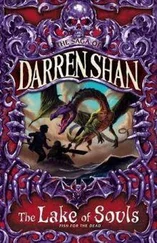Master Blair tossed another piece of swagah to the boy, then shooed him away. He turned to smile at Jebel and Tel Hesani. “Last chance, good sirs. We’re sailing north, following much the same route as you. But we’ll cover it faster, and we won’t have to worry about cannibals, alligators, mosquitoes, or the other nuisances of the swamp. We’ll gladly take you with us.”
“We can’t,” Jebel said miserably. “It’s a condition of the quest.”
“Very well. On your own heads be it.” Master Blair jumped down into the boat and untied the last of the knots.
“There’s a bordello two streets over,” Master Bush said as they pushed out into the current. “It has a cellar bar, one of the worst holes in Shihat — and that’s saying something! But it’s dark and quiet there. My advice is to pick your way to it and keep your heads down until morning.”
“Thank you,” Jebel said, sorry to see the pair leave, despite the trouble they’d brought upon him. “I wish you luck with your mining venture.”
“And we wish you all the luck of the gods with your quest,” Master Bush said. As the current caught the skiff, the trader sat alongside Master Blair, and each man took up an oar and began rowing.
“We’ll look for you farther up the trail,” Master Blair called, waving with one hand. “Perhaps our paths will cross again.”
“I hope so,” Jebel replied, waving in return. He would have liked to watch the strange Masters sail out of sight, but Tel Hesani nudged him roughly. “All right,” Jebel snapped. Turning his back on the river, he hurried after Tel Hesani as the slave led him in search of sordid sanctuary.
The cellar bar was dark and moldy, filled with shifty, foul-smelling clients of the bordello. A few candles burned in a corner, the only light except for occasional flares as somebody lit up a length of smoking tobacco.
The pair of refugees bought drinks and stood — there were no chairs or benches — in the darkest crevice, trying to avoid contact with those around them, shivering with cold and fear.
The night passed slowly and uncomfortably. At one point Jebel leaned against the wall and tried to doze standing up. Something long and slimy slithered down the neck of his tunic. Yelping, he tore off the tunic, slapped away a leech-like creature, and kept clear of the wall after that.
Finally, as Jebel was weaving on his feet, Tel Hesani spotted daylight when the door to the cellar opened and another customer stumbled down the steps. “We can leave now,” he said.
“What if the mob’s still out there?” Jebel asked nervously.
Tel Hesani shrugged. “I imagine they will have returned to the inn to slake their thirst hours ago.”
“Then why didn’t we leave sooner?” Jebel snapped.
“Our descriptions will have been passed to the soldiers. It was better to wait until those on the night watch were replaced.”
Leaving the cellar behind — forever, Jebel hoped! — they trudged through the streets. It wasn’t as busy as when they’d arrived the previous evening, but there were enough traders on the move so they didn’t stand out.
They walked to the edge of Shihat and presented themselves to a guard at one of the town’s northern gates. He barely looked at them, only waved them through — the guards had little interest in those heading north.
Jebel and Tel Hesani kept to the west of the as-Surout and marched to where the two main tributaries of the river joined. Once past that, they were in Abu Nekhele. There was a small border crossing, guarded by lazy, sullen soldiers, most of whom had been posted there as a punishment. They demanded a bribe of four silver swagah for Jebel and two for Tel Hesani. At the slave’s urging, Jebel haggled them down to three and one, then the pair were allowed to pass.
The exhausted um Wadi and his slave walked a mile farther, then Tel Hesani pitched a meager camp in a copse by the river. They crawled beneath their blankets, pulled them over their heads, and were dead to the world in minutes.
Tel Hesani was praying when Jebel awoke. The slave prayed at least three times a day, no matter where they were. He’d kneel or sit cross-legged, close his eyes, trace small circles with the thumb and middle finger of his right hand over his eyelids, then place his hands palm down on the ground. Sometimes he stayed like that for ages. Jebel had often wondered whom he prayed to, but hadn’t wished to appear curious, since he was determined to treat Tel Hesani with the disdain a slave deserved. But after last night’s escape, he felt closer to the pale-skinned man. It wasn’t the stirrings of friendship — the very idea made Jebel laugh — but he felt that Tel Hesani need no longer be completely ignored.
When the slave made the small circles over his eyes again and opened them, Jebel said, “Which god were you praying to?”
Tel Hesani regarded the boy with surprise. For a moment he said nothing, and Jebel thought he wasn’t going to reply. But then, glancing at the sky, he said, “My people have only one god.”
Jebel frowned. “What’s his name?”
“God.”
“A god called God?” Jebel snorted. “Ridiculous!”
“Many think so, my lord.” Tel Hesani smiled and pushed himself to his feet to make a fire and prepare breakfast.
“Wait a minute.” Jebel waved him down. “I’m interested in this God of yours.”
Tel Hesani regarded Jebel warily. “What would you like to know?”
“How can you just have one god?” Jebel asked. “Who controls the rivers, the wind, the rain? Who keeps the sun burning and the stars shining? Who blesses marriages, ensures clean births, and oversees the dead?”
“God,” Tel Hesani said simply.
“He does everything?”
The slave nodded. “We believe God is in all places at all times.”
“So he’s responsible for everything that happens?”
“No,” Tel Hesani said. “God could control everything, but he chooses not to. He lets people follow their own path.”
“Then what were you praying to him for?” Jebel asked.
“My people pray to feel closer to God, not to ask him for favors.”
Jebel scratched his head. “If your God is so powerful, why doesn’t he help you? We’ve been taking slaves from Abu Kheshabah for centuries. The Um Kheshabah have no army to stop us from raiding, so we’ve enslaved countless thousands of your people. Why doesn’t your God free you all?”
“He does not wish to interfere. We could never be truly free if he did.”
“He doesn’t sound like much of a god to me,” Jebel huffed. “Our gods are fierce warriors, strong like us. Your God’s weak and pitiful. You would believe in proper gods if you were as mighty as the Um Aineh.”
“But we were,” Tel Hesani said, then immediately went quiet.
“What?” Jebel snapped.
“Nothing, my lord,” said Tel Hesani quickly. “I spoke out of place. I beg—”
“No,” Jebel interrupted. “I want to hear what you were going to say. Tell me.”
“I’d rather not.”
“I don’t care what you’d rather. Tell me!”
“Very well.” Tel Hesani’s eyes flashed with anger. “But I hope my master will remember that he forced me to speak.”
“I won’t whip you,” Jebel promised. “Now tell me what you were going to say.”
“I have seen some of your history books,” Tel Hesani said. “Their records stretch back no more than several hundred years, telling of your wars with the Um Nekhele and your other neighbors. But in the time before that, they claim there was only chaos in this part of the world.
“That’s not true. For thousands of years the Um Kheshabah ruled the land south of the al-Attieg, and Abu Saga too. We were the most ruthless, all-conquering race ever. We invented sea travel, mining techniques, and much more. We developed weapons of great destruction, which have since, praise God, been eliminated. Your people were our slaves. We crushed anyone who stood up to us.
Читать дальше







